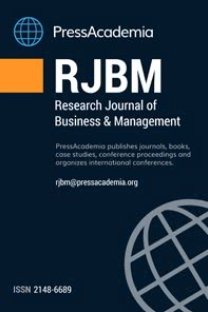IMPORTANCE OF TRANSPARENCY ON SUSTAINABLE SUCCESS ORIENTATION
Nowadays, new developments and changes show us importance of institutional management principles for sustainable success not only in private sector, but in public utilities either. Thus public utilities act as private sector. New developments about new public administration affect both world and Turkish administrative system. Policy and principles as transparency in administration, accountability, communication and governance direct both central and local authorities. This research involves 5 district municipality agreed to participate in. The research started in August 2014. Interviews made with 751 people who will take part in interviews in 5 district municipality were identified. Research shows that the importance of `transparency` for success in public organizations besides all other institutional management principles and it is the most important principle for public organizations due to people.
Keywords:
Transparency corporation, business, corporate governance, competition,
___
- Abdullah A.B.M., Murad W., Hasan M. (2015). A Decision Dynamics Model of Cost Control and Corporate
- Governance. The Journal of Developing Areas, Volume 49, No.2. Abu Bakar, N. B., & Saleh, Z. (2011). Incentives for Disclosure of Accounting Information in PublicSector: A
- Literature Survey International Research Journal of Finance and Economics, Vol:75, P.24 Aguilera, R. V. (2005). Corporate Governance and Director Accountability: An Institutional Comparative
- Perspective. British Journal of Management. Vol 16. 39-53. Al-Saeed, M.A. (2013), Compliance with the Principles of Corporate Governance: Different Perspectives from
- Jordan, Accounting and Management Information Systems Vol. 12, No. 4, ASX. (2007). Corporate Governance Principles and Recommendations.
- ASC Council. Bavly, D. (1999), Corporate Governance and Accountability: What Role for The Regulator, Director and Auditor?, Westport, CT: Greenwood Publishing Group.
- Aucoin, P., Heintzman, R. (2000), The Dialectics of Accountability for Performance in Public Management Reform,
- International Review of Administrative Sciences, 66: 45-55. Bushman, R., Smith, A. (2003), Financial Accounting Information and Corporate Governance, FRBNY Economic Policy Review, P. 66.
- Capital Markets Board of Turkey, (2005). Corporate Governance Principles amended in February2005, retrieved 002015 http://www.cmb.gov.tr/displayfile.aspx?action=displayfile&pageid=84&fn=84.pdf&submenuheader=-1 from
- Choi, J., Sami, H., (2012), Corporate Transparency from the Global Perspective: A Conceptual Overview,
- International Finance Review, Vol.13, P.4 Dağlı, H., Eyüboğlu, K., Ayaydın, H. (2012), Performance Evaluation of Corporate Governance Index in Turkey,
- Journal of Accounting and Finance vol. 12(2). Durnev, A., Errunza, V., Molchanov, A. (2009), Property Rights Protection Corporate Transparency and Growth,
- Journal of International Business, Vol.40, P.1533
- Gompers, P.A., Ishii, J.L., Metrick, A. (2001). Corporate Governance and Equity Prices. NBER Working Paper Series No:84 Cambridge.
- Gönençer, E., (2008). Development of Corporate Governance in the European Union and in Turkey as a Candidate Country.
- Hardman, B. (1996). Corporate Governance: A practical Guide for Directors and Secretaries. Australian Company Secretary. July:235-8
- Jacques, J. A. (2011). Principle of Contemporary Corporate Governance. New York: Cambridge University.
- Justice Owen in the HIH Royal Commission, The Failure of HIH Insurance Volume 1: A Corporate Collapse and Its Lessons, Commonwealth of Australia. April 2003 at page xxxiii
- Kaplan S., (1982). ‘What They Said’. American Bar Association Journal, P.1070
- King Committee on Corporate Governance, & Institute of Directors (South Africa). (2002).King Report on
- Corporate Governance for South Africa, 2002. Institute of Directors in Southern Africa.
- Kolk A., 2008. Sustainability, accountability and corporate governance: Exploring multinationals' reporting practices. Faculty of Economics and Business, Vol. 17, Issue 1, P. 1-15.
- Kothari, S. P., Xu, L., Short, J. E. (2009). The Effect of Disclosures by Management, Analysts, and Business Press on
- Cost of Capital, Return Volatility, and Analyst Forecasts: A Study Using Content Analysis. Accounting Review, 84 (5), 1639-1670
- Mulgan, R., 2003, Holding Power to Account: Accountability in Modern Democracies, Basingstoke: Pelgrave.
- Lazonick, W. and O’Sullivan, M. (1995). Organization, Finance, and International Competition. Industrial and Corporate Change, 4, no. 1-49.
- Pattnaik, C., Gray, S. (2012), Transparency and Governance in a Global World, International Finance Review, Vol.13, P.174
- OECD, OECD Principles of Corporate Governance: 2004 Edition, OECD, Paris.
- Pacala, A. (2012). Corporate Governance: Principles and Regulations, Journal of Electrical and Electronics
- Engineering retrieved 01.08.2015 from http://web.a.ebscohost.com/ehost/pdfviewer/pdfviewer?sid=d8f98e8d- 845d-44d9-b2de-476f6a75a868%40sessionmgr 4005&vid=0&hid =4112
- Pollitt, C., (2003), The Essential Public Manager, London: Open University Press/McGraw-Hill.
- Qian, H., (2012), Preventing Corruption in Public Administration Citizen Engagement for Improved Transparency and Accountability, United Nations Expert Group Meeting Report, 2012, New York.
- Yayın Aralığı: Yılda 4 Sayı
- Başlangıç: 2014
- Yayıncı: PressAcademia
Sayıdaki Diğer Makaleler
Ali ACİLAR, Hakan OLGUN, Aylin GORUR
Lihong SONG, Yongshi LU, Xinchun Lİ
Rafisah RADZİ, İntan Marzita SAİDON, Nadzri Ab GHANİ
